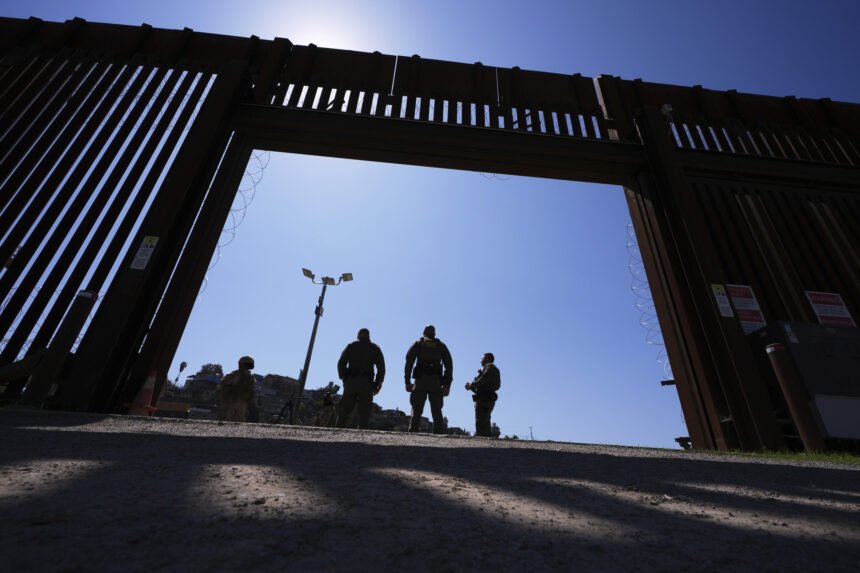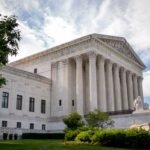China has missed Tuesday’s deadline to remove its retaliatory tariffs on the United States. White House press secretary Karoline Leavitt said today that China was “making a mistake” by responding with its own steep tariffs. The U.S. will now impose an additional 50 percent tariff on Chinese goods, bringing its total levy on Chinese imports to 104 percent, starting Wednesday.
What to know
-
On April 2, Trump announced a 10 percent baseline tariff on all goods imported to the U.S., but certain countries, including China, faced much higher levies. Beijing had already been hit with 20 percent tariffs before Trump added another 34 percent duty last week.
- China pushed back, announcing a 34 percent tariff on the imports of all U.S. goods starting on April 10.
- Trump responded by threatening to add another 50 percent levy on imported Chinese goods if Beijing did not rescind its retaliatory tariffs by noon E.T. on Tuesday—a move that China described as “blackmail.”
Stay with Newsweek for the latest updates.
U.S. and Iran to hold talks in Oman amid nuclear tensions
Iranian officials have confirmed that they will meet with a team from the Trump administration in Oman on Saturday, as the U.S. presses Tehran to abandon its nuclear weapons ambitions. However, there is some disagreement on the nature of the talks. Iranian Foreign Minister Abbas Araghchi described the upcoming engagement as “indirect high-level talks,” adding that “the ball is in America’s court.”
In contrast, Trump has referred to the discussions as “direct talks,” raising questions about the exact format of the meeting. White House press secretary Karoline Leavitt supported Trump’s characterization, stating that the talks would indeed be direct, though she declined to provide further details.
The U.S. and Iran have engaged in indirect talks in recent years, often facilitated by Oman. If the talks are indeed direct, it would mark the first publicly-known direct negotiations between the two countries since Trump withdrew from the Obama-era nuclear deal in 2018.
DHS waiver clears way for border wall construction in California
Border Patrol agents and members of the military stand inside a gate in one of two border walls separating Mexico from the United States during a news conference on joint operations involving the military and…
Gregory Bull/AP Photo
The U.S. Department of Homeland Security issued a waiver Tuesday allowing the federal government to bypass environmental regulations and begin construction on portions of the border wall in Southern California. The waiver, signed by Secretary Kristi Noem, will allow U.S. Customs and Border Protection to proceed with building approximately 2.5 miles of the wall south of San Diego and near Jacumba Hot Springs.
The waiver exempts the government from several laws, including the National Environmental Policy Act, which typically requires federal agencies to assess environmental impacts. This marks the first environmental waiver of President Donald Trump’s second term. The decision aims to expedite the construction process, which the administration cites as crucial for national security.
However, environmental groups have criticized the move. Earthjustice, in particular, warned that bypassing environmental and cultural preservation laws would harm local ecosystems and communities. Cameron Walkup, an associate legislative representative for Earthjustice, expressed concerns about the long-term damage to air, water, and biodiversity.
The Trump administration has prioritized border security, with U.S. Border Patrol reporting the completion of over 50 miles of both permanent and temporary border wall sections since the president’s inauguration. The goal is to build approximately 1,400 miles of continuous barrier. Border Patrol officials stated that about 220 arrests are made daily for illegal crossings at the southern border.
Sen. Ron Wyden introduces resolution to repeal Trump’s tariffs
Senator Ron Wyden has introduced a bipartisan resolution aimed at repealing Trump’s tariffs, though it faces an uphill battle in the Senate, where Republicans control both chambers. The resolution is privileged, which means it will be expedited to the Senate floor for a vote, requiring a majority for approval.
Wyden, who serves as the top Democrat on the Senate Finance Committee, expressed concern that Trump’s tariffs were pushing the economy toward recession, causing job losses, and negatively impacting seniors’ retirement savings. He previewed the resolution earlier during a Senate hearing.
Joining Wyden in supporting the resolution is Senator Rand Paul who has been vocal in his opposition to tariffs, calling them “taxes” that should be controlled by Congress, not the president. The resolution also has the backing of several other senators, including Chuck Schumer, Tim Kaine, Jeanne Shaheen, Peter Welch, and Elizabeth Warren.
Republican senator says Trump ‘decided to begin a trade war on all fronts’
President Donald Trump’s top trade negotiator was grilled on the global tariffs as he testified at the Senate Finance Committee Tuesday.
“It seems like we’ve decided to begin a trade war on all fronts,″ said Republican Sen. Thom Tillis of North Carolina.
Tillis said that he wanted to know who he should hold responsible in the Trump administration if the tariffs slowed economic growth and increased prics.
He said he wanted to know who in the Trump administration he should hold responsible — and “choke″ — if the tariffs fail and Americans suffer from higher prices and slower economic growth.
“I wish you well,″ he told U.S. Trade Representative Jamieson Greer. “But I am skeptical.”
Hegseth says U.S. will not allow China to ‘weaponize’ Panama Canal
Speaking after his meeting with Panama President José Raúl Mulino, Secretary of Defense Pete Hegseth said the U.S. will not allow China, or any other country, to “endanger” the Panama Canal.
“China did not build this canal, China does not operate this canal and China will not weaponize this canal,” Hegseth said as he welcomed Panama’s decision to withdraw from China’s Belt and Road global infrastructure initiative.
“Together, with Panama in the lead, we will keep the canal secure and available for all nations through the deterrent power of the strongest, most effective and most lethal fighting force in the world.”
Fact Check: Is Donald Trump declaring martial law?
Social media platforms like TikTok have become fertile ground for unfounded theories that President Donald Trump will declare martial law on April 20 — despite any supporting evidence.
While a signed executive order has triggered some debate over a possible use of the Insurrection Act, there is no credible evidence or reporting that martial law is being considered anywhere in the U.S.
An executive order signed by President Trump on Inauguration Day directs the Department of Defense and Department of Homeland Security to submit a report by April 20 assessing the situation at the southern border and recommending whether to invoke the Insurrection Act of 1807 for purposes of border enforcement.
The order reads: “Within 90 days of the date of this proclamation, the Secretary of Defense and the Secretary of Homeland Security shall submit a joint report to the President… including whether to invoke the Insurrection Act of 1807.”
Rumors online have spiraled into predictions of impending martial law, using the Jan. 20 executive order as cover. The hashtag #martiallaw has been used in 21.5k posts across TikTok, some of which refer to the April 20 date.
In one video, TikTok user @Aja_Ky pointed to the executive order tied to the Department of Defense and Homeland Security and said: “The only way [Trump] has to do this is to declare and publish a proclamation that orders these parties to disperse.” The claim, however, remain unsupported by any official documentation or action.
White House reacts to Elon Musk-Peter Navarro feud: ‘Boys will be boys’
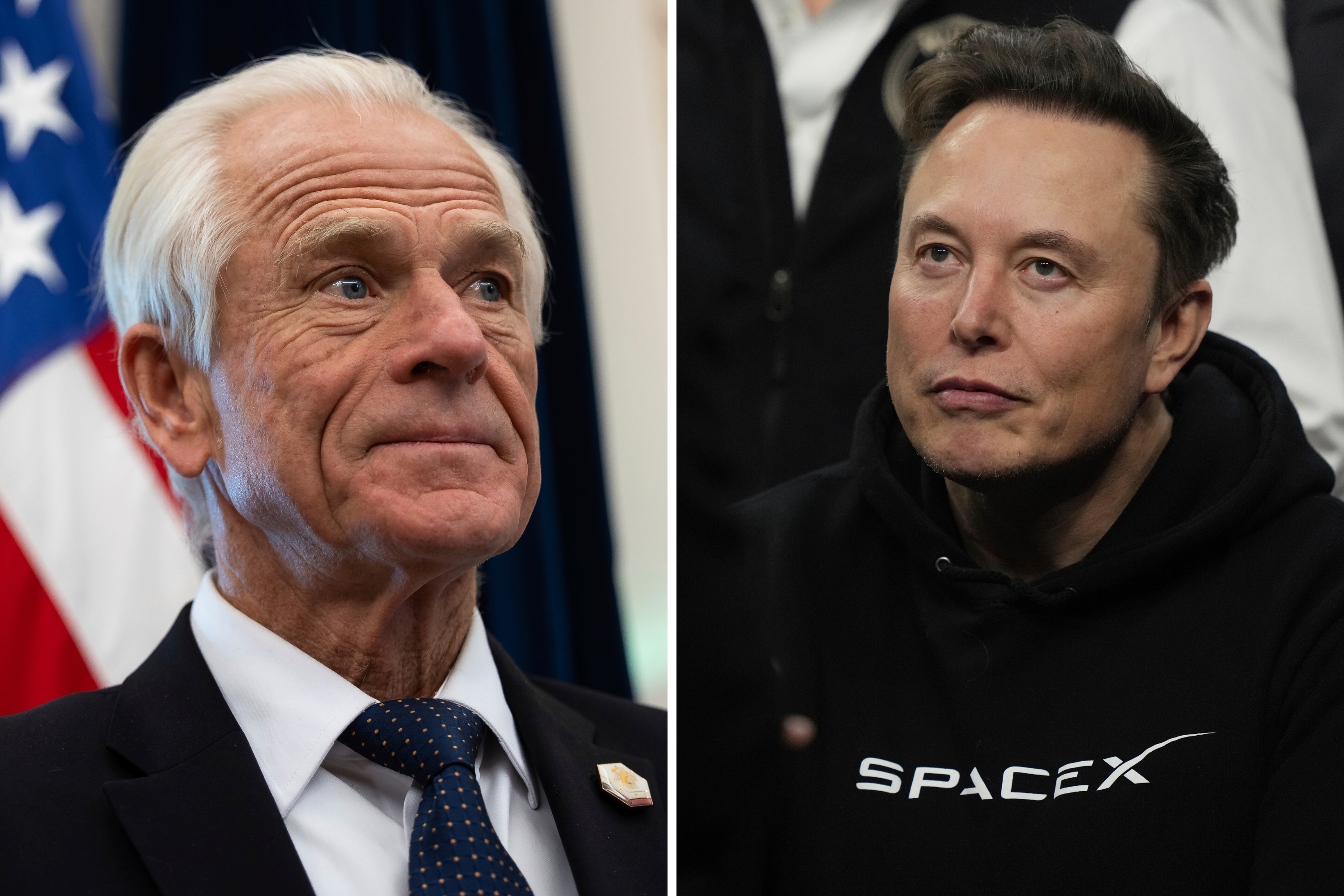
Left: White House Senior Counselor for Trade and Manufacturing Peter Navarro is seen in the Oval Office at the White House March 26, 2025. Right: Elon Musk attends the finals for the NCAA wrestling championship,…
Associated Press
White House press secretary Karoline Leavitt responded to a question regarding Elon Musk’s recent scathing remarks about President Donald Trump‘s trade adviser Peter Navarro.
Musk called President Donald Trump‘s trade adviser Peter Navarro “truly a moron” and “dumber than a sack of bricks” in a post on X, formerly Twitter, on Tuesday. Musk, a top White House adviser on federal spending cuts, was responding to comments made by Navarro on CNBC about how Tesla makes its cars.
When asked about the feud, and how it could impact the public’s understanding of Trump’s tariffs, Leavitt said Tuesday, “These are obviously two individuals who have very different views on trade and on tariffs. Boys will be boys, and we will let their public sparring continue. You guys should all be very grateful that we have the most transparent administration in history.”
She continued during her weekly press conference, “It also speaks to the president’s willingness to hear from all sides. He has people at the highest levels of this government, of this White House, who have very diverse opinions on very diverse issues. The president takes all opinions in mind, and then makes the best decision based on the best interest of the American public.”
US defense secretary meets with Panama president ahead of dock ribbon-cutting
U.S. Defense Secretary Pete Hegseth met with Panama President José Raúl Mulino on Tuesday, prior to attending a ribbon-cutting ceremony for a new U.S.-financed dock at a former U.S. military base.
While Hegseth did not comment publicly following the meeting, he shared a photo of the two men laughing on social media, calling it an honor to speak with Mulino. He praised Panama’s efforts, stating that increased security cooperation between the two nations would enhance their safety, strength, and prosperity.
The meeting comes amid tensions over former President Donald Trump’s claims that the U.S. is overcharged for using the Panama Canal, and allegations that China holds influence over its operations. Panama has denied these accusations.
China misses tariffs deadline, will face 104 percent duty
China has missed Tuesday’s deadline to remove its retaliatory tariffs on the United States.
White House press secretary Karoline Leavitt said today that China was “making a mistake” by responding with its own steep tariffs.
On April 2, Trump announced a 10 percent baseline tariff on all goods imported to the U.S., but certain countries, including China, faced much higher levies. Beijing had already been hit with 20 percent tariffs, before Trump added another 34 percent duty last week.
China pushed back, announcing a 34 percent tariff on the imports of all U.S. goods starting on April 10.
Trump responded by threatening to add another 50 percent levy on imported Chinese goods if Beijing did not rescind its retaliatory tariffs by noon E.T. on Tuesday—a move that China described as “blackmail
The U.S. will now impose an additional 50 percent tariff on Chinese goods, bringing its total levy on Chinese imports to 104 percent, starting Wednesday.
White House says its open to offers on tariffs
The White House has announced that President Trump’s tariffs are bargaining chips to reach better international trade deals.
“Bring us your best offers and he will listen,” White House press secretary Karoline Leavitt said, suggesting Trump was open to negotiation on the tariffs.
Leavitt said Israeli Prime Minister Benjamin Netanyahu’s visit to Washington to discuss trade “should serve as a model.”
Leavitt also criticized China who she said was “making a mistake” by responding with its own steep tariffs.
El Salvador president to visit White House to discuss its prison for deportees
El Salvador President Nayib Bukele is visiting Donald Trump at the White House on Monday, to discuss the use of the country’s “super max prison for Tren De Aragua and MS-13 gang members,” press secretary Karoline Leavitt said today.
Cecot mega-prison can hold 40,000 as one of the largest prisons in the Americas.
The United States has been using the prison to send deportees that the Trump administration say are gang members.
Bukele and Trump are expected to talk about their countries’ partnership and how “El Salvador’s cooperation with the United States has become a model for others to work with this administration,” Leavitt said at the press briefing.
‘Magnificent Seven’ stock groups bounce back
The “Magnificent Seven”, the dominant group U.S. stocks that are so big that they carry more weight that the S&P 500, have started to bounce back.
Following a turbulent week in the stock market which has seen record lows not seen in years, Nvidia and Tesla are now leading the back in gaining back some of its losses, with a gain of 5.5% and 5.4%, respectively.
Microsoft, Apple, Amazon, Meta Platforms and Google parent Alphabet are all up between 3% and 2.1%.
Is Elon Musk splitting with Trump over Tariffs? Everything we know
Elon Musk and President Donald Trump have very different perspectives on the “Liberation Day” tariffs, making the last few days the most tumultuous part of their relationship so far.
The Tesla and SpaceX CEO has openly criticized Trump’s latest tariff policies and the officials supporting them, marking a rare public divergence between two high-profile allies.
Musk’s support for Trump has been the defining relationship of the president’s second administration, as Musk has taken a key role in both the public face of the White House and its policy, spearheading the Department of Government Efficiency’s cuts to federal spending. However, in recent weeks, there has been increasing indication that Musk could take a step back.
Last Wednesday, Trump announced a universal tariff on all imports, with a minimum level of 10 percent for each country.
Italian prime minister to meet Trump next week to discuss tariffs: Report

Prime Minister of Italy Giorgia Meloni is talking to media at the end of the EU Summit in the Europea building on March 6, 2025 in Brussels, Belgium.
Thierry Monasse/Getty Images
Italian Prime Minister Giorgia Meloni is expected to meet President Donald Trump next Thursday to negotiate some relief from tariffs, CNN reports.
Meloni is a right-wing politician with close ties to Trump and even attended his inauguration.
World leaders will be watching the outcome of their meeting closely to see if Trump will make a deal with Italy, which may open the door to easing the levies on the European Union at large.
House Armed Services members push back on possible U.S. troop cuts in Europe
Members of the House Armed Services Committee from both parties strongly criticized the Trump administration Tuesday over reports that U.S. troop levels in Europe could be reduced, calling the move dangerous and a threat to NATO cohesion.
Committee Chair Rep. Michael Rogers, R-Mich., warned against cutting forces or relinquishing command roles in NATO. “U.S. leadership in NATO is essential,” Rogers said, adding that American control of its troops and nuclear arsenal must remain intact.
Army Gen. Christopher Cavoli, head of U.S. European Command and NATO’s top military officer, told lawmakers he has recommended maintaining current troop levels—about 100,000 soldiers, up significantly since Russia’s 2022 invasion of Ukraine.
Democrats also voiced concern. Rep. Adam Smith, D-Wash., accused former President Donald Trump of emboldening Russian President Vladimir Putin and weakening Ukraine support. Rep. Salud Carbajal, D-Calif., criticized defense official Katherine Thompson for vague answers about Trump’s NATO and Ukraine positions.
While the Pentagon said no decisions have been made, lawmakers across the aisle made clear any cuts would face strong opposition.
Donald Trump health update ahead of new physical
President Donald Trump will undergo his annual physical on Friday. Here’s what we know about Trump’s health ahead of the medical examination as the president says he’s “never felt better.”
Newsweek reached out to the White House via email for comment.
Trump took office in January following extensive speculation about former President Joe Biden‘s health towards the end of his term.
The health of a U.S. president has often been important to Americans, who have a vested interest in the mental and physical ability of the person making decisions for the country.
On Monday, Trump posted on Truth Social: “I am pleased to report that my long-scheduled Annual Physical Examination will be done at Walter Reed Army Medical Center on Friday of this week. I have never felt better, but nevertheless, these things must be done!”
At 78, Trump is among the oldest presidents in United States history. The leadup to the 2024 presidential election was marked with frequent speculation about then-President Joe Biden’s physical health and mental acuity. Biden turned 82 shortly after the November election. The Trump camp often referenced Trump being younger and fitter than Biden on the campaign trail.
There was a controversy over Trump’s medical records last October after he said he would “gladly” release the documents and then failed to produce them.
Trump set to sign executive order to ‘reinvigorate’ coal industry
President Donald Trump is set to sign an executive order aimed at “reinvigorating” the U.S. coal industry, according to White House press secretary Karoline Leavitt.
Trump is scheduled to sign the order to “unleash American energy” at 3 p.m. ET on Tuesday, according to the White House.
“Coal is critical to achieving American Energy and AI Dominance,” Leavitt said on X.
Trump has repeatedly said he wants to bring back coal and rollback some of the protections and restrictions imposed by former Presidents Barack Obama and Joe Biden.
Today at 3PM, President Trump will sign an Executive Order to reinvigorate AFFORDABLE, RELIABLE, AND CLEAN COAL!
Coal is critical to achieving American Energy and AI Dominance. Read more here⬇️https://t.co/Yz26ERVQtN
— Karoline Leavitt (@PressSec) April 8, 2025
Democratic states push back on Trump administration’s DEI funding threat
Several Democratic-led states and cities are rejecting a Trump administration move to cut education funding over diversity, equity, and inclusion (DEI) programs, setting up a legal and political clash over federal authority in schools.
Minnesota and New York said they won’t comply with a new Education Department order demanding school systems certify they don’t use what the agency calls “illegal DEI practices.” California and Vermont told schools they don’t need to respond, while Chicago’s mayor said he’s prepared to sue if funds are withheld.
The Education Department has told states they risk losing funding if districts use DEI efforts to “advantage one’s race over another.” The order, part of President Donald Trump’s broader agenda, drew sharp criticism from Minnesota’s education commissioner, who called it an overreach of federal power.
Some Republican-led states are backing the order, but others, including Missouri, say existing certifications should be sufficient. The deadline for compliance was recently extended to April 24.
Justice Department disbands crypto crime team under Trump order

Then Former President Donald Trump speaks at the Bitcoin 2024 Conference, July 27, 2024, in Nashville, Tenn.
Mark Humphrey/Getty Images
The Justice Department is shutting down a team of prosecutors that investigated cryptocurrency crimes, marking a shift away from complex crypto enforcement, according to a memo obtained by the Associated Press.
Deputy Attorney General Todd Blanche wrote that the department would no longer pursue broad crypto cases tied to banking or securities law, calling previous efforts under the Biden administration “reckless” and “poorly executed.”
The move aligns with Trump’s focus on immigration and drug-related crimes. Blanche said enforcement would now target those using crypto to commit fraud, fund trafficking, or terrorism.
The disbanded National Cryptocurrency Enforcement Team was formed under Biden to target crypto misuse. Its closure takes effect immediately.
Supreme Court hands Donald Trump another win
The Supreme Court on Tuesday sided with the Trump administration, allowing it to keep thousands of probationary federal employees off the payroll as it moves forward with efforts to dismiss them—a significant legal victory for the White House.
The ruling puts on hold a lower court judge’s order that had mandated the reinstatement of more than 16,000 probationary workers, as legal challenges to the administration’s downsizing plan continue to play out in the courts.
On Monday, in another key decision, the Supreme Court permitted the Trump administration to resume deportations of alleged Venezuelan gang members under the Alien Enemies Act, a wartime-era law. The 5-4 ruling overturned a lower court’s pause on deportations, granting the administration greater discretion in immigration enforcement.
These back-to-back decisions mark legal momentum for the White House as it tests the limits of presidential power in reshaping federal agencies and immigration policy.
US trade rep says tariffs are bringing countries to negotiating table
U.S. Trade Representative Jamieson Greer told the Senate Finance Committee on Tuesday that Donald Trump’s tariffs were already getting results.
Greer said that the levies, which have sent global markets into a tailspin, have brought around 50 countries to the negotiating table to discuss changing their barriers to trade.
He testified that Vietnam, which was hit with a 46% tariff, is cutting its own tariffs on American apples, almonds and cherries.
Greer admitted to the committee that the tariffs and their fallout may “be challenging at times,” but were necessary to reduce America’s trade deficits.
House Democrat moves to block Trump’s global tariffs
Rep. Gregory Meeks is preparing to force a House vote to terminate President Donald Trump’s global tariffs set to take effect this week, a person familiar with the plans said.
The New York Democrat will introduce a privileged resolution to reverse the tariffs announced April 2. If deemed privileged, the measure must be voted on within 15 days, despite likely opposition from GOP leadership.
Though the resolution is expected to fail—Trump has vowed to override any attempt to block the tariffs—Democrats want to pressure Republicans into choosing between supporting the president or curbing potential price hikes for consumers.
Iran-US nuclear talks: Six points to watch
The United States and Iran are preparing for talks on Tehran’s nuclear program in Oman to avert a possible military confrontation that could have devastating consequences far beyond the Middle East.
The talks follow President Donald’s Trump’s “maximum pressure” campaign of toughened sanctions on Iran and a build up of military force in the region.
Trump has said he prefers to negotiate a deal, but will use force if need be.
U.S. and Russia to hold embassy talks Thursday in Istanbul
A Russian foreign ministry delegation will meet with U.S. officials Thursday in Istanbul to discuss restoring normal embassy operations, the Kremlin said.
The Russian side will be led by Ambassador Alexander Darchiev, while Deputy Assistant Secretary of State Sonata Coulter will represent the U.S., according to Russian state media outlet TASS.
The discussions aim to “normalize the work of the embassies,” following earlier talks on February 27 focused on easing diplomatic tensions.
The U.S. State Department previously described those meetings as “constructive.” Kremlin officials said further negotiations will continue through Russia’s foreign ministry.
US sees big drop in tourists from overseas
The United States has seen a big drop in tourism from overseas visitors, compared to the same time last year.
Visits to America fell 11.6% in March as tourism experts believe foreign travelers have been alarmed by reports of tourists being arrested at the border or angered by Donald Trump’s tariffs and rhetoric involving America’s allies.
Ian Urquhart, a professor emeritus at the University of Alberta in Edmonton, Canada, was supposed to go to Las Vegas for five days in June and see Coldplay in concert.
He told AP he canceled the trip to protest Trump’s “incredibly disparaging tone” toward Canada, even though it meant losing his $500 deposit.
His oldest daughter also canceled a trip to Sedona, Arizona and his brother-in-law canceled his weeklong golf trip to Scottsdale, Arizona.
“None of us jumped for joy when we made those decisions, but it seemed to be one of the few ways we could signal how we felt about the bullying that has been directed towards Canada by your president,” Urquhart said.
The CEO of research institute that studies the preferences of Chinese tourists said trips to places such as Disneyland, Hawaii and New York had dropped dramatically.
The Travel and Tourism Office data didn’t include land arrivals from Canada or Mexico, both of which are expected to have dropped significantly.
U.S. Steel shares hit 52-week high after Trump orders new deal review
Shares of U.S. Steel jumped to a 52-week high after former President Donald Trump ordered a national security review of Nippon Steel’s proposed $15 billion acquisition. The move comes months after President Joe Biden blocked the deal, citing concerns over labor and national interests.
The Committee on Foreign Investment in the United States (CFIUS) now has 45 days to review the transaction and report back. Trump said the review would help him determine if further action is needed.
Shares rose 16% Monday and edged higher Tuesday. Ancora Holdings, a U.S. Steel stakeholder, said it supports delaying the company’s annual meeting until after the CFIUS decision is made in June.
The proposed deal has been at the center of political debate, particularly in the key swing state of Pennsylvania. Nippon and U.S. Steel have filed a lawsuit challenging the Biden administration’s earlier decision to block the merger.
South African citrus industry warns new Trump tariffs could cost 35,000 jobs
South Africa’s citrus industry could face major setbacks as new U.S. tariffs take effect Wednesday, according to the Citrus Growers’ Association of Southern Africa. The group warns the tariffs threaten around 35,000 jobs and could devastate entire towns that depend on citrus farming.
The association says the added costs could push up U.S. retail prices by $4.25 per carton, making South African citrus less competitive in a market it helps supply during America’s off-season.
South Africa is the world’s second-largest orange exporter after Spain and ranks fourth in soft citrus exports, based on data from the World Citrus Organization.
Republicans turn on Donald Trump over Social Security cuts
Two Republican Senators voted against the GOP and President Donald Trump last week in favor of an amendment that would have reversed Department of Government Efficiency (DOGE) cuts at the Social Security Administration (SSA).
The vote took place late Friday night as the Senate voted on Trump’s multitrillion-dollar tax breaks and spending cuts framework.
Since Trump’s return to the White House in January, the DOGE taskforce has implemented significant budget and staffing cuts across federal agencies as the president aims to reduce government spending.
The SSA, which pays benefits to approximately 70 million Americans, is no exception. DOGE’s mandates include workforce reductions, the closure of internal departments, and changes to phone line services.
On Friday, Republican Senators Dan Sullivan and Lisa Murkowski, both from Alaska, voted in favor of an amendment that sought to reverse “cuts to the Social Security Administration, which may include cuts ordered by the Department of Government Efficiency or any other cuts to seniors’ services.” It failed to pass in a 50-49 vote.
Experts weigh in on impact of Trump’s new tariffs
On today’s CNN News Central, anchors Kate Bolduan and John Berman spoke with former Biden White House Chief Economist Ernie Tedeschi, Rep. Ritchie Torres (D-NY), and Sen. Ron Wyden (D-OR) about President Trump’s newly implemented tariffs and their potential effects on the economy.
Ernie Tedeschi explained how lower-income Americans would be hit hardest by the tariffs. He emphasized that lower-income families, who spend a larger portion of their income on imports, would feel the impact more acutely than wealthier families, leading to a significant reduction in purchasing power.
Rep. Ritchie Torres dismissed Peter Navarro’s assertion that the tariffs wouldn’t lead to a recession or inflation, calling him a “voodoo economist.” Torres argued that the Trump administration’s policies were bringing both recession and inflation, marking a troubling economic trend for the U.S.
Sen. Ron Wyden also criticized the Trump administration’s inconsistent approach to tariffs, calling the situation “economic poison” for Americans. He expressed frustration with the administration’s inability to negotiate effectively on trade, describing their policy as difficult to understand and inconsistent.
Judge cancels hearing on injunction request after Supreme Court ruling
Judge James Boasberg has canceled a scheduled hearing on the request for a preliminary injunction against Trump’s use of the Alien Enemies Act for deportations.
The move follows a Supreme Court decision on Monday that allowed the administration to enforce the 1798 law for now. This ruling grants immigration officials the authority to rapidly deport alleged gang members using wartime powers while the case proceeds in lower courts.
The court’s decision included provisions for deportees to be notified of their status under the act and allowed a review of their removal. The ruling was met with dissent from the court’s three liberal justices and a partial dissent from Justice Amy Coney Barrett.
Elon Musk calls Peter Navarro ‘truly a moron’
Elon Musk fired back at Peter Navarro, a former trade adviser, calling him “truly a moron” and “dumber than a sack of bricks” on X.
The exchange came after Navarro accused Musk of “protecting his own interests” by opposing tariffs, also labeling Tesla as a “car assembler” reliant on imported parts.
Musk rejected Navarro’s comments, pointing to data that shows Tesla produces the “most American-made cars.”
President to meet House Republicans to discuss budget resolution
On Tuesday, the president will meet with House Republicans at the White House to discuss the ongoing effort to pass the party’s budget resolution.
The meeting is set for 1 p.m., according to sources familiar with the matter, per The Associated Press.
Press secretary confirms Trump coal executive order signing at 3 today
White House Press Secretary Karoline Leavitt confirms that Trump will sign an executive order at 3 p.m. to expand the domestic coal industry.
Today at 3PM, President Trump will sign an Executive Order to reinvigorate AFFORDABLE, RELIABLE, AND CLEAN COAL!
Coal is critical to achieving American Energy and AI Dominance. Read more here⬇️https://t.co/Yz26ERVQtN
— Karoline Leavitt (@PressSec) April 8, 2025
Donald Trump is losing the crypto bros over tariff turmoil
The crypto community has not been spared the tariff-induced panic that swept American and global markets last week, with many of its key voices now lashing out at the man once thought to be heralding a new age for digital assets.
While losses on Wall Street tempered on Monday, the stock market has undergone a bear run since President Trump announced his flat 10 percent tariff on all global imports, alongside country-specific reciprocal duties on dozens of trading partners.
Ahead of markets opening on Tuesday, the S&P 500 was down 10.7 percent, the Dow Jones Industrial Average by 10.2 percent, and the Nasdaq composite by 11.4 percent following Trump’s Rose Garden Speech.
Bitcoin saw a similar slide immediately following the announcements—shedding over $4,000 between Wednesday evening and Thursday morning—but remained relatively stable at around $83,000 while global financial markets entered freefall.
Many prominent voices in the crypto space were adamant that this particular asset class would be spared the effects of the new import taxes, given that blockchain-based transactions involve no borders or customs authorities, and argued that the case for crypto had been strengthened, not weakened, by the global economy entering a new era of mercantilism and trade barriers.
Trump discusses call with South Korean president
In a recent Truth Social post, Trump shared details of a call with the Acting President of South Korea, covering a range of issues including trade surpluses, tariffs, shipbuilding, and military protection.
Trump’s tariffs on agriculture: impact on milk producers and trade balance
Today, Gregg Doud, president and CEO of the National Milk Producers Federation, discussed Trump’s tariffs and their potential impact on American agricultural industries during an interview on CNN’s Early Start. Doud expressed support for the tariffs, particularly in regard to the trade imbalance with the European Union. He highlighted the $23.6 billion deficit in agricultural trade, emphasizing that the U.S. imports $3 billion in dairy products from the EU, while only exporting $167 million in return.
Doud explained that this trade imbalance, particularly in dairy products, is a long-standing issue, pointing out that the U.S. dairy exports to the EU have remained stagnant since 1980. He argued that tariffs could level the playing field and give U.S. producers better access to European markets.
While Doud acknowledged the challenges faced by U.S. soybean exporters due to competition from Brazil and the soft Chinese economy, he remained optimistic about the future of the U.S. dairy industry. He noted significant investments in dairy processing, signaling growth and potential in the sector.
Doud’s comments came in response to a broader discussion about the uncertainty surrounding the administration’s tariff policy, as President Trump has indicated that the tariffs may be both permanent and a negotiating tool. Despite mixed messages from the White House, Doud expressed confidence in the long-term benefits of tariffs for U.S. agriculture.
The conversation also touched on the concerns raised by Republican Senator Thom Tillis about the immediate economic pain farmers are experiencing, particularly in sectors like soybeans. Doud agreed that the soybean market is facing difficulties but emphasized the broader competitive nature of global agricultural trade.
Trump’s trade representative to defend tariffs in Senate hearing
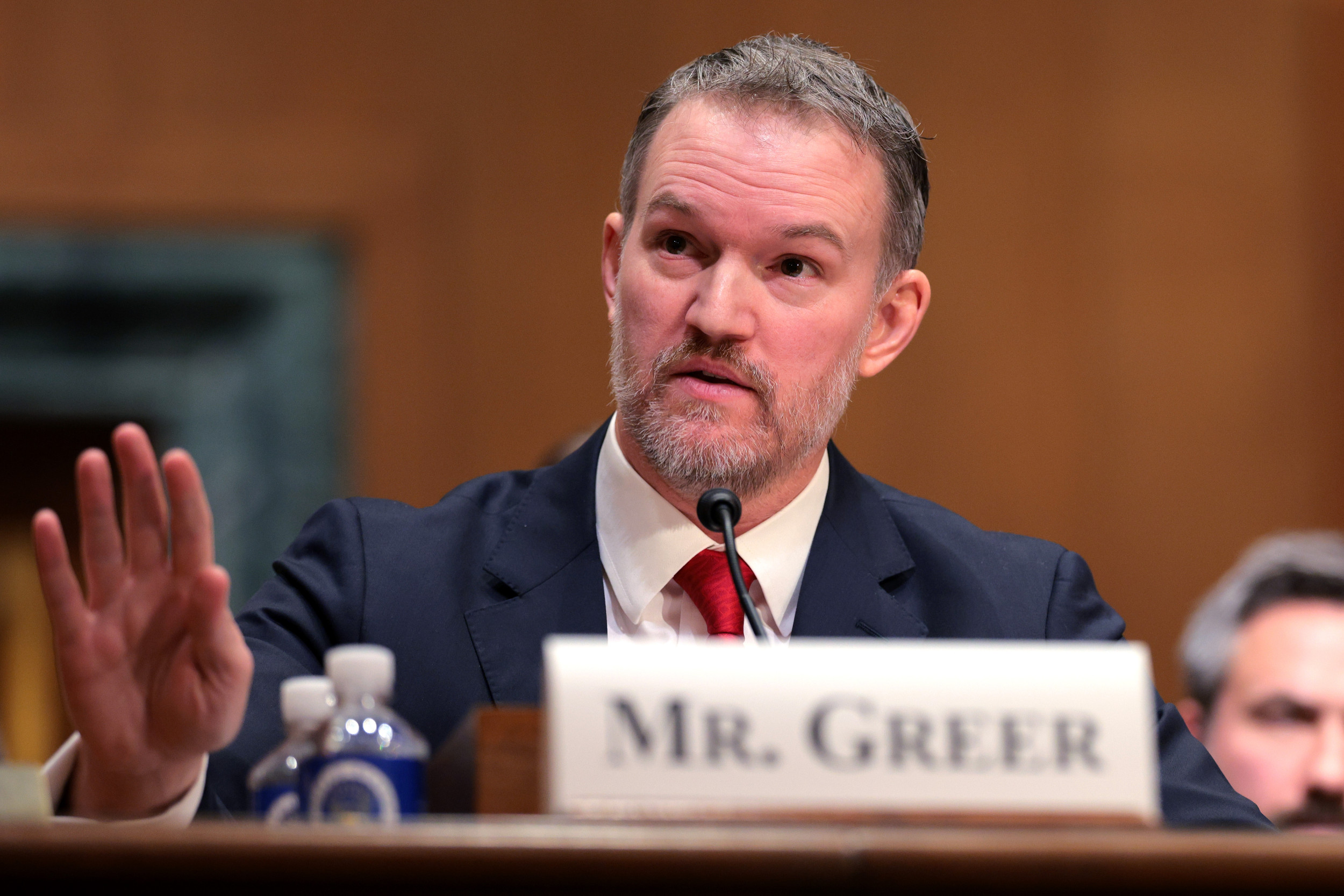
Jamieson Greer, President Donald Trump’s nominee to be the U.S. Trade Representative, testifies during his Senate Finance Committee confirmation hearing at the Dirksen Senate Office on February 06, 2025 in Washington, DC.
Kayla Bartkowski/Getty Images
U.S. Trade Representative Jamieson Greer is scheduled to testify before the Senate Finance Committee today, where he will defend the Trump administration’s tariff policies.
In his prepared remarks, Greer is expected to explain that the tariffs were a response to the growing trade deficit, which he attributes to unbalanced trade practices by foreign countries, per CNN. He will highlight that President Trump declared a national emergency to address these economic imbalances.
Greer is also set to emphasize the positive outcomes of the tariff strategy, noting that nearly 50 countries have shown interest in discussing the new policies and seeking reciprocal trade agreements.
The hearing will begin at 10 a.m. ET.
The Smoot-Hawley Tariff Act and its lasting impact on U.S. trade policy
In the early 1930s, with the Great Depression in full swing, Republicans Rep. Willis Hawley and Sen. Reed Smoot pushed for the Smoot-Hawley Tariff Act, aiming to protect American farmers and manufacturers from foreign competition. Signed into law by President Herbert Hoover in 1930, the act raised tariffs on thousands of imported goods. While it was intended to shield U.S. industries, it instead triggered retaliatory tariffs from other countries, worsening the economic crisis.
Historically, Smoot-Hawley is seen as a major misstep, amplifying the financial difficulties of the Depression. Hoover, who entered the presidency with a background in business, hoped the tariffs would stimulate growth, but the results were disastrous. U.S. trade partners retaliated, and the economy continued its downward spiral. This failure has long been viewed as one of the key miscalculations that delayed the country’s recovery, which only began with World War II’s industrial demands.
Though President Donald Trump has revived the tariff debate, invoking the protectionist policies of the past, his approach differs from Hoover’s. Trump has argued that high tariffs are essential for protecting U.S. manufacturing, even as critics warn of similar global repercussions. The history of tariffs in the U.S. stretches back to the nation’s founding, with various acts aimed at protecting domestic industry, but the results have often been mixed, with both benefits and harm to consumers and manufacturers alike.
The Smoot-Hawley Tariff Act, a product of its time, remains a cautionary tale about the unintended consequences of protectionist policies. As President Trump pursues his own tariff agenda, the echoes of past mistakes resonate, raising questions about the balance between safeguarding national industries and fostering global economic cooperation.
Health Secretary Robert F. Kennedy Jr. plans to review fluoride recommendations
U.S. Health Secretary Robert F. Kennedy Jr. announced Monday that he intends to instruct the Centers for Disease Control and Prevention (CDC) to stop recommending fluoride in community drinking water. Kennedy revealed he is forming a task force of health experts to evaluate the issue and propose new guidelines.
Additionally, the U.S. Environmental Protection Agency (EPA) said it is reviewing new scientific data regarding the potential health risks of fluoride in drinking water. The EPA is responsible for setting the maximum fluoride levels allowed in public water systems.
While Kennedy cannot directly mandate that communities stop fluoridating water, he can direct the CDC to cease its recommendations and collaborate with the EPA to adjust the permissible fluoride levels.
Utah recently became the first state to ban fluoride in public drinking water, despite opposition from dental professionals and national health organizations who argue the decision could harm low-income residents who may not have access to regular dental care.
Iran, U.S. to hold indirect talks on nuclear issue in Oman
Iran’s Foreign Minister Abbas Araghchi will begin indirect discussions with U.S. Middle East envoy Steve Witkoff in Oman on Saturday, as reported by Iran’s semi-official Tasnim News. The talks, mediated by Oman, will focus on Iranian denuclearization, although President Donald Trump had previously claimed that direct U.S.-Iran talks had already started.
Araghchi confirmed the indirect nature of the talks, telling Tasnim that Oman would facilitate the discussions. The U.S. has not engaged in direct negotiations with Iran since the 2015 nuclear deal, which saw Iran scale back its nuclear activities in exchange for sanctions relief. However, after Trump withdrew from the agreement in 2018, Tehran resumed its nuclear program.
“It is as much an opportunity as it is a test. The ball is in America’s court,” Araghchi stated on social media.
Trump initiates national security review of Nippon Steel’s bid for U.S. Steel
U.S. Steel shares saw an uptick ahead of the opening bell Tuesday after Trump ordered a new national security review of Nippon Steel’s proposed $15 billion acquisition of the American company, The Associated Press reported. This decision follows a move by President Joe Biden to block the deal just before leaving office.
Trump instructed the Committee on Foreign Investment in the United States (CFIUS) to evaluate any national security risks posed by the proposed transaction. The review will give Nippon Steel and U.S. Steel an opportunity to address concerns raised during the evaluation process. CFIUS will submit its findings and recommendations within 45 days.
In 2023, Nippon Steel made a bid to acquire U.S. Steel, but the transaction became a political issue due to its potential impact on the state of Pennsylvania, home to U.S. Steel’s headquarters. The United Steelworkers union raised concerns about job cuts and the company’s financial practices, prompting Biden to block the merger, a stance that Trump had also previously opposed. The Japanese steelmaker responded by filing a federal lawsuit challenging the block.
Despite initial indications that Nippon Steel might abandon its acquisition plans, Trump suggested in February that the company would instead make a significant investment in U.S. Steel.
Trump to sign executive orders to support coal industry
Trump is expected to sign a series of executive orders Tuesday aimed at reviving the U.S. coal industry, Reuters reported, citing two sources familiar with the plan.
The orders, which will be signed at the White House, will direct the Interior and Energy Departments to take steps to support coal production and prevent the closure of aging power plants, one source said.
Coal once accounted for more than half of U.S. electricity generation but now makes up less than 20%, according to the Energy Information Administration.
Trump, who pledged during his campaign to boost domestic energy production, has consistently criticized environmental rules he says unfairly target coal. The White House has not released full details of the orders but confirmed the signing will take place at 3 p.m. Eastern.
OPINION: China can’t win a trade war against the U.S. for one simple reason
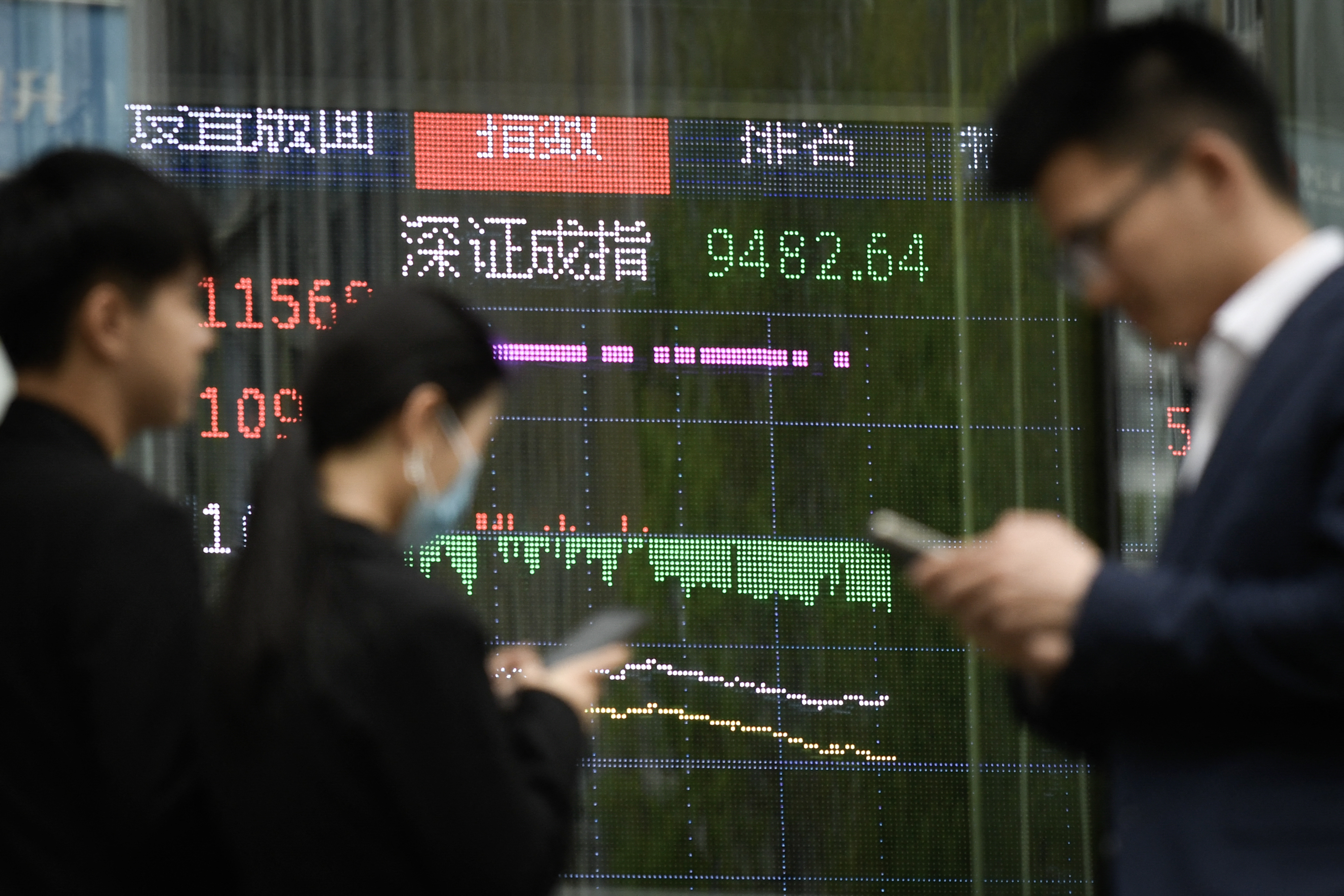
People walk past a screen showing Chinese stock market movements in Beijing on April 7. Asian equities collapsed on a black Monday on April 7.
WANG ZHAO/AFP via Getty Images
President Donald Trump threatened an additional 50 percent tariff on Chinese goods if Beijing did not rescind by today its retaliatory 34 percent tariff imposed Friday.
The Chinese rate is the same as that Trump slapped on Chinese products on April 2.
The new rounds of American and Chinese tariffs are escalations. Trump in February and March imposed two rounds of 10 percent tariffs on China for its role in the fentanyl crisis. With these three rounds of additional tariffs and other measures, the effective U.S. rate on Chinese goods is about 65 percent. If he goes ahead with the 50 percent levy, the rate hits 115 percent.
China this year added retaliatory tariffs of 10 percent and 15 percent on certain American products.
The trade war is on. Who backs down?
“Anyone expecting President Xi to come calling and seek a call with President Trump following April 2 tariff announcement is being dangerously naive,” the widely followed Ryan Hass of the Brookings Institution posted on X on Friday. “Anyone advising Trump that Xi will beg for forgiveness is committing malpractice. That is not the mood or the plan in Beijing now.”
Read the full opinion piece by author and commentator Gordon C. Chang on Newsweek.
U.S. and China clash again as global leaders react to escalating tariffs
Tensions between the U.S. and China surged Tuesday as President Donald Trump threatened an additional 50% tariff on Chinese goods, prompting a sharp rebuke from Beijing. In response, China vowed to “fight to the end,” accusing the U.S. of blackmail and vowing countermeasures.
The Chinese Commerce Ministry said the latest tariff threats expose the U.S.’s coercive tactics. Beijing’s foreign ministry also criticized Washington for lacking sincerity in its approach to dialogue, saying future talks must be based on “equality and mutual respect.”
Meanwhile, market turmoil triggered by the escalating trade war prompted global leaders to take action. Japan’s Prime Minister Shigeru Ishiba formed a task force to mitigate the fallout of the 24% tariffs levied on Japanese exports. India’s foreign minister urged progress on a trade deal with the U.S., while Malaysian Prime Minister Anwar Ibrahim advocated for “quiet engagement” through ASEAN channels.
Hong Kong’s leader John Lee condemned the tariffs as “ruthless,” vowing to expand free trade ties and align more closely with mainland China. As the trade dispute deepens, more countries are now seeking ways to minimize economic damage and navigate an increasingly fractured global trade environment.
How much does China charge the U.S. in tariffs?
Beijing recently announced a sweeping 34% tariff on all U.S. goods, mirroring the latest escalation from Washington. This comes on top of earlier 10-15% tariffs China imposed earlier this year on U.S. agricultural and energy exports. According to Morgan Stanley economist Robin Xing, the move has raised the U.S. average tariff rate on Chinese goods to as high as 65%. While the full cost to American exporters depends on the product, analysts say the new round of duties significantly intensifies the financial strain on both sides.
China’s Ministry of Foreign Affairs said the country “will continue to take resolute measures” to protect its interests. That includes broader restrictions on U.S. companies operating in China and new export controls on rare earths and dual-use technology.
Beijing’s retaliation marks a notable shift away from earlier restraint, raising the chances of prolonged tariff escalation with no near-term deal in sight.
Donald Trump’s polling after ‘liberation day’ is disastrous for Republicans
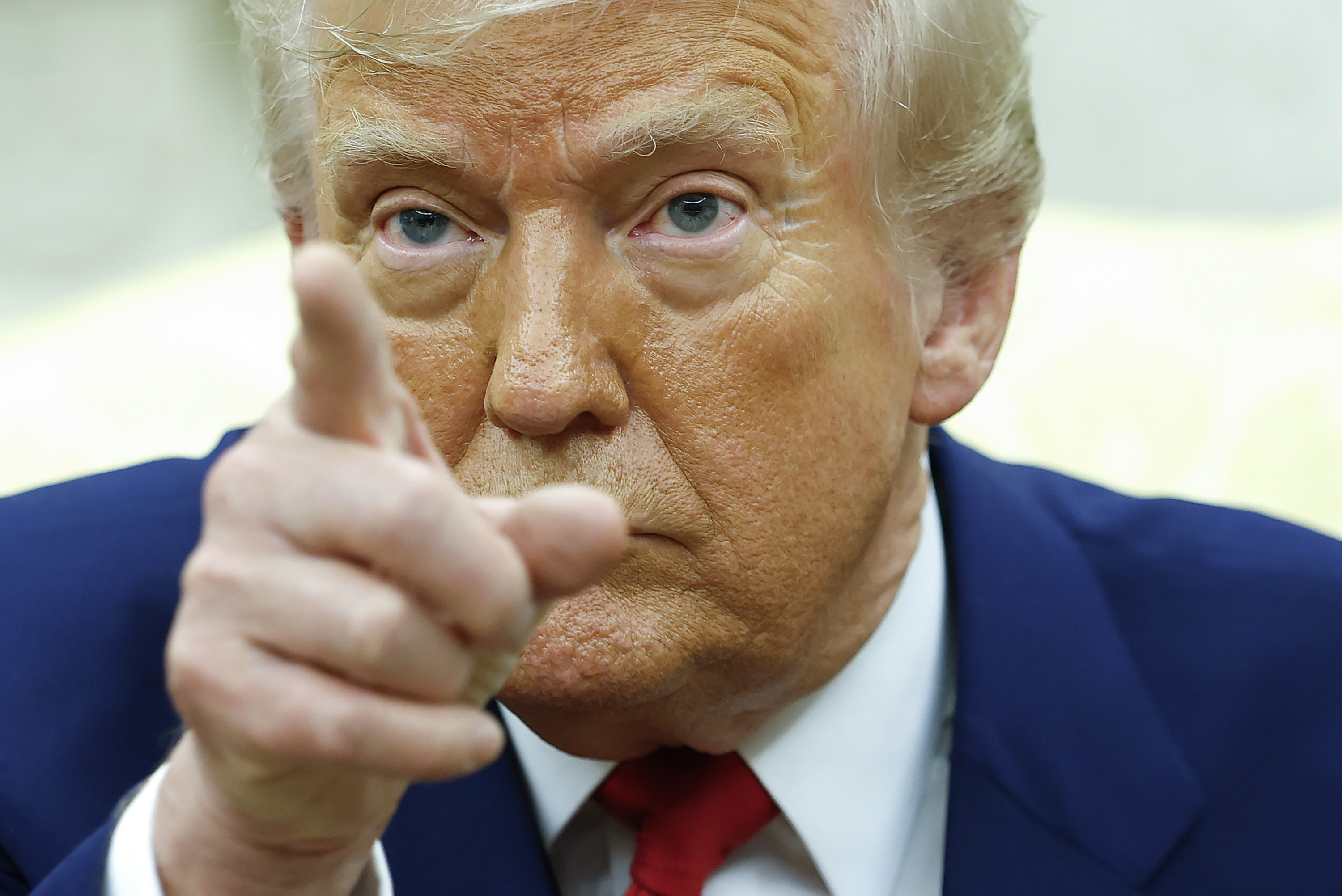
U.S. President Donald Trump answers a reporter’s question in the Oval Office of the White House on April 7, 2025 in Washington, DC.
Kevin Dietsch/Getty Images
Amajority of American adults are deeply skeptical about President Donald Trump’s new tariff policy according to a new YouGov survey, with more than half of those polled saying they regard the policy as “the largest peacetime tax hike in U.S. history.”
Newsweek contacted the Republican National Committee for comment via online inquiry form on Tuesday outside of regular office hours.
The YouGov poll is a sign that the series of tariffs Trump has imposed since his second inauguration in January might have backfired politically and damaged the president and the Republican Party.
On Wednesday April 2, which Trump dubbed “Liberation Day,” the president announced extensive new tariffs which credit ratings agency Fitch said will take them to their highest overall level since 1910.
Trump imposed a “baseline” 10 percent levy on all imports along with what he called “discount reciprocal tariffs” on dozens of countries, including a 34 percent levy on China, 25 percent on South Korea and 20 percent on the European Union.
This was on top of tariffs Trump announced on China, Mexico and Canada earlier in his presidency, and on Monday the president said the levy on Beijing would rise by an additional 50 percent in response to Chinese counter tariffs.
YouGov surveyed 1,139 adult U.S. citizens between April 3 and 6 with a four percent margin of error. The poll found 51 percent of Americans agreed that the tariffs are “the largest peacetime tax hike in U.S. history,” split between 30 percent who said they “strongly agree” and 21 percent who “somewhat agree.” By contrast, only 20 percent said they disagreed either strongly or somewhat, with the remainder not sure.




